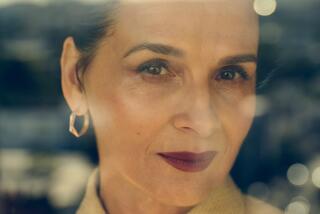In France, a political star seems ready to rise again
She has been described as the nearest thing France has to Barack Obama.
The story of Rachida Dati, the child of illiterate North African immigrants who scrambled out of poverty to one of the highest offices in France, certainly echoes that of the U.S. president.
Add her feisty, full-of-herself manner and unabashed ambition, not to mention her taste for vertigo-inducing heels and Dior dresses, and Dati brings a certain je ne sais quoi to her Gallic version of the American dream.
To French President Nicolas Sarkozy, who named her France’s first Muslim Cabinet member and called her ma beurette (“my little Arab girl”), the glamorous Dati represented what the disadvantaged could accomplish if they worked hard enough.
Dati’s success was indeed remarkable: Few of France’s estimated 6 million Muslims hold positions of influence in government, academia, business or the media.
But her fall was as rapid as her rise had been meteoric. The unmarried Dati became pregnant and refused to name the father, igniting furious speculation about his identity. Then she was accused of spreading rumors that Sarkozy’s marriage to supermodel Carla Bruni was in trouble, accusations she denied. Sarkozy sent her to serve in the European Parliament, the French equivalent of exile.
Today, after two years in the political wilderness, the former justice minister has left little doubt that she intends to rise again.
Dati, 45, has been making headlines with a memoir she wrote to counter the “lies and insults” of her critics. In a few weeks she will begin campaigning for Sarkozy for next spring’s presidential election; she intends to seek a seat in Parliament around the same time.
Now the elected mayor of Paris’ ritzy 7th arrondissement, she aims to become mayor of all Paris in 2014, an established launchpad for the ultimate job at the Elysee Palace.
Dati is an object of fascination for the French. In her home turf, the 7th, the sight of her brings people into the street to shake her hand. No one doubts her ambition or star power. The question is whether she has the maturity and mettle to reach the apex of French political power.
“She manages to be political, powerful, authoritarian and intelligent, and at the same time beautiful, interesting and a star,” says French journalist Valerie Domain, a former editor at Gala, one of the glossy magazines that have closely chronicled Dati’s career. “Her story is like an ultra-modern fairytale, but if she wants to make a comeback, she has to convince people it is more than an illusion.”
Mariette Sineau, an expert on gender and politics at the Institute of Political Studies in Paris, says Dati is a potent symbol on many levels.
“She was a woman, she was young, she was Maghreban [North African] and she was from a very modest family background,” Sineau said. “That she could become minister of justice was like opening a route for other people with her profile. That’s why she is very popular in the opinion polls. People like the fact she has succeeded.”
As for Dati’s prospects for higher office, Sineau says it would be foolish to write her off. “By seeking election to Parliament, she is constructing her political legitimacy. She is definitely one to follow.”
Sitting in a large leather chair behind an even larger desk in her mayoral office, her dark, kohl-lined eyes constantly straying to her BlackBerry, Dati appears slight and sparrow-like. The impression is deceptive.
Critics of her imperious style often describe her as antipathique — standoffish or aloof. Her admirers cite her considerable charm; her career modus operandi has been to persuade powerful strangers to take her under their wing.
“I approached them and asked because I’m not afraid of anything and I had nothing to lose,” she says.
Asked whether she intends to run for president one day, Dati is uncharacteristically coy. “Well, errr, it’s complicated … um, it doesn’t work like that…,” she says.
Pressed, she says: “Why not, if I can do something for my country? But it is complicated.
“I believe France is ready for a woman president, but the French political class is not,” she says. “Then again, if someone had said a few years ago that someone from a poor immigrant family, and a woman too, would become justice minister, everyone would have said, ‘Impossible.’”
The 7th arrondissement is a long way from the outskirts of Chalon-sur-Saone in east-central France, where she was born in 1965, one of 12 children of a Muslim bricklayer from Morocco and an Algerian mother — neither of whom could read or write. Their home had a wood stove for heat and an outdoor bathroom.
Her neighbors, she writes in her memoir, were “haggard people who didn’t take care of themselves; people who failed to say bonjour; an alcoholic couple who lived with five dogs; slovenly men who spent their days in front of the television; idle youngsters in the hall of the building.”
Her father, M’Barek, enrolled Rachida and her elder sister in a Catholic school and rejected free lessons or other handouts, insisting they be “treated like the others.”
Though a diligent student, Dati was often punished for rebelliousness. “Rachida,” the nuns wrote in a report to her mother, “is not an easy child.”
On her 16th birthday, she experienced an “identity earthquake.” She received an official letter informing her that she would have to acquire a residency permit because both her parents were foreigners.
“I was born in France. I had grown up in France. French was my mother tongue,” she writes in her memoir. “France was the only country of which I knew the history and geography by heart. And suddenly, at 16 years old, I discover I am Moroccan.
“Yes, under the Made in France surface, I was still a foreigner in the eyes of the administration of the country, my country.”
Today Dati has both French and Moroccan nationality but says she considers herself a “Frenchwoman of French origins” and “100% French.”
She studied medicine in Dijon but switched to business studies and gained degrees in economics and law. She worked as an accountant for the French oil giant Elf petroleum and in London for the European Bank for Reconstruction and Development before qualifying as a magistrate, a state-appointed official who presides over trials in France.
In 2002, she heard Sarkozy, then interior minister, give a speech on crime and security. She wrote him to ask for a meeting. He agreed and was so impressed that he made her one of his advisors, and then his spokeswoman during the 2007 election campaign. Her reward, when he won, was the justice post in his right-of-center administration.
Dati was one of the original “Sarkozettes,” a handful of mold-breaking young women from different ethnic backgrounds whom Sarkozy brought into government to symbolize his commitment to diversity.
She moved swiftly to institute reforms he had promised during the campaign, including a restructuring of the French court system and tougher sentencing laws for minors and repeat offenders. Some of the changes proved disruptive and unpopular. Some courts were closed and judges sacked. Magistrates went on strike.
Dati’s chief of staff resigned after a month, accusing her of being authoritarian, controlling and impossible to work with.
Her penchant for designer clothes and sexy shoes, and her decision to pose for the cover of Paris Match magazine in a pink Dior dress, led to criticism that she favored style over substance and had forgotten her roots.
Nevertheless, she contends that her tenure as a Cabinet minister was an unqualified success. “I pushed through all the reforms I set out to push through,” she says.
Dati dismisses the criticism as the result of jealousy or contempt for her “foreign” background.
“Are people saying I shouldn’t wear nice clothes, have my hair done, wear makeup, be feminine? I have always considered femininity to be part of my identity. When you represent the institutions and dignity of your country, you don’t dress in a sack.”
When Dati became pregnant and refused to identify the father, such was the frenzy of speculation that Jose Maria Aznar, the former Spanish prime minister, made an astonishing public denial of paternity.
Five days after her daughter, Zohra, was born in 2009, Dati, then 43, donned her highest heels and snappiest suit and returned to work, sparking a new furor over whether she had boosted or betrayed the cause of working women by failing to take maternity leave.
On Dati’s mayoral desk, tucked under files and letters addressed to “Madame le Maire,” are several pieces of paper covered in splashes of paint. Asked whether they are Zohra’s creations, Dati’s face softens and she stops fiddling with her BlackBerry.
She says the child is the cornerstone of her life. “It’s complicated juggling, but I think I’ve got the work-home balance right,” she says. “I’m not going to complain. It’s easier for me than for many other women, and it’s just a question of organization. I have never for one minute considered giving up work.”
Willsher is a special correspondent.
More to Read
Start your day right
Sign up for Essential California for news, features and recommendations from the L.A. Times and beyond in your inbox six days a week.
You may occasionally receive promotional content from the Los Angeles Times.






